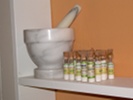Colds and flus are an uncomfortable part of the fall and winter seasons. Having occasional colds is actually good for the immune system. A healthy number is about one per year for adults and up to four per year for children. But these illnesses are not very fun. Fortunately, naturopathic medicine and Chinese medicine can be very helpful for reducing the strength of the symptoms and the length of time that you feel sick. Think about coming in for a visit and treatment when you or your child feels a cold coming on or later in the course of the cold if you’re not getting better. Additionally, you can follow the suggestions below to prevent colds in the first place, and reduce its severity if you do catch one.
Prevention
 Hand washing – washing your hands with soap and warm water, then drying your hands has been shown to be very effective in reducing the spread of cold and flu virus. Ordinary soap is fine, it does not need to be medicated. Masks can also reduce transmission of the virus (which is mostly through droplets–sneezes, nasal discharge, and saliva).
Hand washing – washing your hands with soap and warm water, then drying your hands has been shown to be very effective in reducing the spread of cold and flu virus. Ordinary soap is fine, it does not need to be medicated. Masks can also reduce transmission of the virus (which is mostly through droplets–sneezes, nasal discharge, and saliva).
Dietary choices and Supplements
- Reduce your sugar intake: Sugar depresses the immune system and reduces your defenses to incoming viruses and bacteria.
- Vit. C containing foods: vitamin C can reduce the length of a cold
- Probiotics: A study published in the August ‘09 issue of the journal Pediatrics found that:
“Daily dietary probiotic supplementation for 6 months was a safe effective way to reduce fever, rhinorrhea [runny nose], and cough incidence and duration and antibiotic prescription incidence, as well as the number of missed school days attributable to illness, for children 3 to 5 years of age.”
The study found that a combination of lactobacillus acidophilus and bifidobacterium animalis had the best results. When looking for a probiotic, you are usually better off with those that require refrigeration, and have at least five billion organisms per dose.
Herbs (a few, there are many other helpful herbs)

- Echinacea: enhances the immune system’s reaction to infection, can be used to prevent or help treat illness, a commonly used remedy containing echinacea is Esberitox.
- Elder flowers: have historically been used for early stages of colds and flus, and is a safe and gentle herb for use with kids.
- Linden flowers: can shorten the length of a viral infection
- Goldenseal: good for infections especially bacterial with thick, yellow mucous
Homeopathy:
Homeopathic treatment can be a great option when you are getting a cold or flu. It can be gentle and effective–when a correct remedy is taken. It is also one of the safest possible treatments for children.

- occillococcinum: a brand name remedy found at many grocery stores. Take as directed on the package at the first sign of the flu. It has been shown to reduce duration of the flu. It is less effective if the illness has had a few days to progress.
- individual homeopathic remedies: these must be carefully chosen to match you or your child’s symptoms, but can be used at varying stages of illness. A great reference to learn homeopathic prescribing for colds and flu’s is Miranda Castro’s book, “The Complete Homeopathy Handbook”. Or consult with a professional trained in homeopathy.
When you’ve got a cold or the flu
- hydrotherapy – hydrotherapy is the use of alternating applications of heat and cold to stimulate the body’s immune system and healing. It may be used for both acute and chronic conditions. Several hydrotherapy techniques are especially helpful when colds are just beginning. Consult a naturopathic physician to learn techniques that you can use at home to help with colds and flus.
- Western and Chinese herbs and acupuncture – can often shorten the duration of a cold or flu and reduce complications, or can help with the after affects, such as lingering coughs or sinus infections.
- When is a fever too high? – Though uncomfortable, fevers can often be healthy responses to illness. At higher temperatures the immune system works more efficiently and can better destroy attacking viruses or bacteria. Stopping a fever too early with aspirin or tylenol can therefore prolong the course of an infection and deprive the immune system of the chance to learn to fight off invasions efficiently. However there can be too much of a good thing. Fevers approaching 105 or above can be a serious medical emergency and children or adults with very high fevers should be seen by a doctor or taken to the emergency room.
- Antibiotics, yes or no? – No! Unless you have a cold or flu that weakens your immune system to the point that you get a bacterial infection, antibiotics will not do a thing, since they kill bacteria and do not affect viruses. Influenza and the most common variants of the common cold are caused by viruses. If you think you or your child might have a bacterial infection (common signs include very high fever which comes on quickly, and thick discharge, often yellow or greenish) then you should see your health care provider, antibiotics may well be warranted. If you do take antibiotics, always follow-up with probiotics–antibiotics kill off your good gut bugs as well as the infection, and prolonged or repeated use may lead to digestive and immune system issues.
 If you or your child has a cold or the flu and you’d like additional help beyond the steps above, please call to make an appointment, 503-974-0914.
If you or your child has a cold or the flu and you’d like additional help beyond the steps above, please call to make an appointment, 503-974-0914.
Images courtesy of:
Leslie Stroope
Melinda Nickels
Image: graur razvan ionut / FreeDigitalPhotos.net

